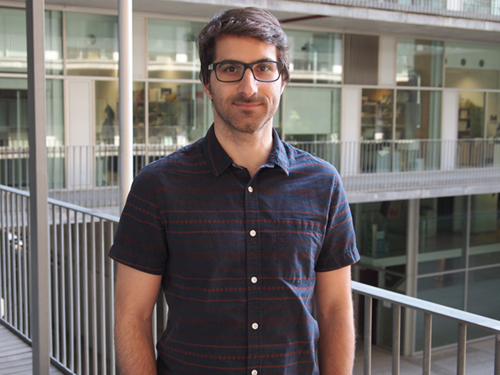
Dr. Toni Celià-Terrassa, a researcher at the Hospital del Mar Medical Research Institute has received a grant from the Cancer Research Institute to analyse this possibility.
Immunotherapy, the use of the patient's own immune system to attack tumour cells is the method chosen by the Hospital del Mar and its research centre, the Hospital del Mar Medical Research Institute (IMIM) in their search for new breast cancer treatments. They are looking in particular at triple negative breast cancer, one of the most aggressive types, which, in addition, affects younger patients and is the breast tumour with the fewest therapeutic targets for oncologists. This commitment has received a strong boost thanks to the grant the Cancer Research Institute (CRI) has just awarded the project "LCOR orchestrates the differential IFN-a response and immunological properties of triple-negative breast cancer cells", led by Dr. Toni Celià-Terrassa, a researcher in the Molecular Therapy of Cancer group, directed by Dr. Joan Albanell, head of medical oncology at Hospital del Mar and director of the IMIM's Cancer Research programme.
Dr. Celià-Terrassa, who runs the Cancer Stem Cell Properties and Metastasis Laboratory, and his team have received $200,000 from this non-profit organisation based in New York, USA, which finances cancer immunotherapy research worldwide. It is the first time that a Catalan Research centre has received a CLIP grant from this institute. "Getting funding from the Cancer Research Institute is a privilege and will be a great boost in our research on triple-negative breast cancer for which we have few therapeutic targets. The hope of this project is to find new strategies to strengthen immunotherapy responses in this type of cancer and avoid relapse", states Dr. Celià-Terrassa. The grant will enable extra research staff to be hired, to promote investigation into this area.

Photo: Dr.Toni Celià-Terrassa/ Font: IMIM
Immunotherapy in breast cancer
Cancer immunotherapy treatment, a field in which Hospital del Mar is at the forefront, is already being used successfully for certain types of tumours, including lung cancer and melanoma. As Dr. Celià-Terrassa explains, using antibodies that block the control points in the immune system, the response rates vary between 20 and 30%. But these figures have not been achieved in breast cancer and immunotherapy is not yet a viable alternative to conventional chemotherapy. "We want to look further into why there is not a high response rate, if this is due to the heterogeneity of the tumour, and whether there are certain populations of cells within the tumour that are more resistant to immunotherapy than others", he points out. The project that has received the award from the CRI will analyse this approach in triple negative-type breast cancer.
To do this, they will study the properties of tumour subpopulations that avoid the immune system, from a basic point of view and with a translational approach. In other words, they will use this information to design therapeutic targets that can take advantage of molecules that are already being used to treat other types of tumours with immunotherapy. "Our intention is to find specific treatment configurations and adjust them for breast cancer", says Dr. Toni Celià-Terrassa. They will also look for markers that allow them to predict the response to this treatment.
For this reason, Dr. Joan Albanell, head of medical oncology at Hospital del Mar and director of the IMIM's Cancer Research programme, has highlighted the fact that "immunotherapy shows promise in triple-negative breast cancer, but the clinical results are still insufficient. One reason behind this limited immunotherapy activity seems to be that certain tumour cells are virtually invisible to the immune system." For this reason, he argues that "making them visible could be a major step forward towards improving immunotherapy results in breast cancer."
Dr. Toni Celià-Terrassa
Dr. Toni Celià-Terrassa, who heads up theIMIM's Cancer Stem Cell Properties and Metastasis lab, joined this institute in January 2018, thanks to a Miquel Servet grant, from the University of Princeton, where he worked between 2012 and 2017. There he specialised in research into breast cancer metastasis and looked at the intricate molecular mechanisms of normal and malignant mammary stem cells to protect themselves from immune system signals in triple-negative breast cancer.
A prestigious institute
The Cancer Research Institute was founded in 1953 by Helen Coley Nauts and Oliver R. Grace, the parents of immunotherapy, with the aim of boosting the development of immunological cancer treatments. Each year, the entity funds around 10 CLIP projects in research centres and organisations across the globe to advance the fight against this disease. It is currently directed by Dr. James P. Allison, one of the pioneers of 21st century immunotherapy and director of the immunotherapy platform at the MD Anderson Cancer Centre.
Servei de Comunicació:
Marta Calsina(ELIMINAR)
Tel:
(+34) 93 316 06 80
Doctor Aiguader, 88
08226 Barcelona
© Institut Hospital del Mar
d'Investigacions MèdiquesLegal Notice and Privacy Policy | Cookie Policy | Site Index | Accessibility | Find Us | Contact